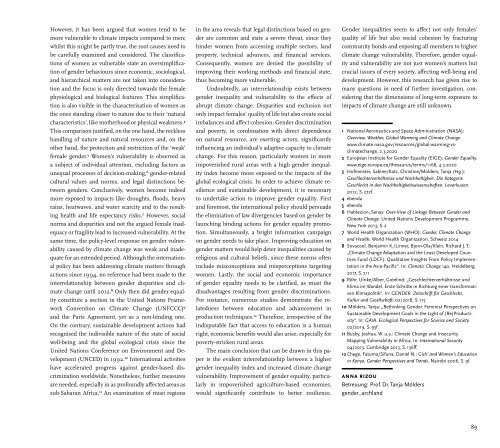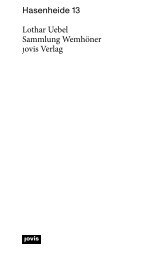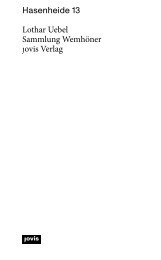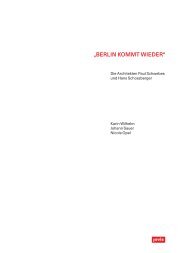Hochweit 2020
ISBN 978-3-86859-649-6
ISBN 978-3-86859-649-6
Sie wollen auch ein ePaper? Erhöhen Sie die Reichweite Ihrer Titel.
YUMPU macht aus Druck-PDFs automatisch weboptimierte ePaper, die Google liebt.
However, it has been argued that women tend to be<br />
more vulnerable to climate impacts compared to men;<br />
whilst this might be partly true, the root causes need to<br />
be carefully examined and considered. The classifications<br />
of women as vulnerable state an oversimplification<br />
of gender behaviours since economic, sociological,<br />
and hierarchical matters are not taken into consideration<br />
and the focus is only directed towards the female<br />
physiological and biological features. This simplification<br />
is also visible in the characterisation of women as<br />
the ones standing closer to nature due to their ‘natural<br />
characteristics’, like motherhood or physical weakness. 4<br />
This comparison justified, on the one hand, the reckless<br />
handling of nature and natural resources and, on the<br />
other hand, the protection and restriction of the ‘weak’<br />
female gender. 5 Women’s vulnerability is observed as<br />
a subject of individual attention, excluding factors as<br />
unequal processes of decision-making, 6 gender-related<br />
cultural values and norms, and legal distinctions between<br />
genders. Conclusively, women become indeed<br />
more exposed to impacts like droughts, floods, heavy<br />
rains, heatwaves, and water scarcity and to the resulting<br />
health and life expectancy risks. 7 However, social<br />
norms and disparities and not the argued female inadequacy<br />
or fragility lead to increased vulnerability. At the<br />
same time, the policy-level response on gender vulnerability<br />
caused by climate change was weak and inadequate<br />
for an extended period. Although the international<br />
policy has been addressing climate matters through<br />
actions since 1994, no reference had been made to the<br />
interrelationship between gender disparities and climate<br />
change until 2012. 8 Only then did gender equality<br />
constitute a section in the United Nations Framework<br />
Convention on Climate Change (UNFCCC) 9<br />
and the Paris Agreement, yet as a non-binding one.<br />
On the contrary, sustainable development actions had<br />
recognised the indivisible nature of the state of social<br />
well-being and the global ecological crisis since the<br />
United Nations Conference on Environment and Development<br />
(UNCED) in 1992. 10 International activities<br />
have accelerated progress against gender-based discrimination<br />
worldwide. Nonetheless, further measures<br />
are needed, especially in as profoundly affected areas as<br />
sub-Saharan Africa. 11 An examination of most regions<br />
in the area reveals that legal distinctions based on gender<br />
are common and state a severe threat, since they<br />
hinder women from accessing multiple sectors, land<br />
property, technical advances, and financial services.<br />
Consequently, women are denied the possibility of<br />
improving their working methods and financial state,<br />
thus becoming more vulnerable.<br />
Undoubtedly, an interrelationship exists between<br />
gender inequality and vulnerability to the effects of<br />
abrupt climate change. Disparities and exclusion not<br />
only impact females’ quality of life but also create social<br />
imbalances and affect cohesion. Gender discrimination<br />
and poverty, in combination with direct dependence<br />
on natural resource, are exerting actors, significantly<br />
influencing an individual’s adaptive capacity to climate<br />
change. For this reason, particularly women in more<br />
impoverished rural areas with a high gender inequality<br />
index become more exposed to the impacts of the<br />
global ecological crisis. In order to achieve climate resilience<br />
and sustainable development, it is necessary<br />
to undertake action to improve gender equality. First<br />
and foremost, the international policy should persuade<br />
the elimination of law divergencies based on gender by<br />
launching binding actions for gender equality promotion.<br />
Simultaneously, a bright information campaign<br />
on gender needs to take place. Improving education on<br />
gender matters would help deter inequalities caused by<br />
religious and cultural beliefs, since these norms often<br />
include misconceptions and misperceptions targeting<br />
women. Lastly, the social and economic importance<br />
of gender equality needs to be clarified, as must the<br />
disadvantages resulting from gender discriminations.<br />
For instance, numerous studies demonstrate the relatedness<br />
between education and advancement in<br />
production techniques. 12 Therefore, irrespective of the<br />
indisputable fact that access to education is a human<br />
right, economic benefits would also arise, especially for<br />
poverty-stricken rural areas.<br />
The main conclusion that can be drawn in this paper<br />
is the evident interrelationship between a higher<br />
gender inequality index and increased climate change<br />
vulnerability. Improvement of gender equality, particularly<br />
in impoverished agriculture-based economies,<br />
would significantly contribute to better resilience.<br />
Gender inequalities seem to affect not only females’<br />
quality of life but also social cohesion by fracturing<br />
community bonds and exposing all members to higher<br />
climate change vulnerability. Therefore, gender equality<br />
and vulnerability are not just women’s matters but<br />
crucial issues of every society, affecting well-being and<br />
development. However, this research has given rise to<br />
many questions in need of further investigation, considering<br />
that the dimensions of long-term exposure to<br />
impacts of climate change are still unknown.<br />
1 National Aeronautics and Space Administration (NASA):<br />
Overview. Weather, Global Warming and Climate Change.<br />
www.climate.nasa.gov/resources/global-warming-vsclimatechange,<br />
2.3.<strong>2020</strong><br />
2 European Institute for Gender Equality (EIGE): Gender Equality.<br />
www.eige.europa.eu/thesaurus/terms/1168, 4.3.<strong>2020</strong><br />
3 Hofmeister, Sabine/Katz, Christine/Molders, Tanja (Hg.):<br />
Geschlechterverhältnisse und Nachhaltigkeit. Die Kategorie<br />
Geschlecht in den Nachhaltigkeitswissenschaften. Leverkusen<br />
2012, S. 272f.<br />
4 ebenda<br />
5 ebenda<br />
6 Habtezion, Senay: Over-View of Linkage Between Gender and<br />
Climate Change. United Nations Development Programme,<br />
New York 2013, S. 2<br />
7 World Health Organization (WHO): Gender, Climate Change<br />
and Health. World Health Organization, Schweiz 2014<br />
8 Sovacool, Benjamin K./Linner, Bjorn-Ola/Klein, Richard J. T.:<br />
„Climate Change Adaptation and the Least Developed Countries<br />
Fund (LDCF). Qualitative Insights From Policy Implementation<br />
in the Asia-Pacific“. In: Climatic Change 140. Heidelberg<br />
2017, S. 211<br />
9 Röhr, Ulrike/Alber, Gotelind: „Geschlechterverhältnisse und<br />
Klima im Wandel. Erste Schritte in Richtung einer transformativen<br />
Klimapolitik“. In: GENDER. Zeitschrift für Geschlecht,<br />
Kultur und Gesellschaft. 02/2018, S. 115<br />
10 Mölders, Tanja: „Rethinking Gender. Feminist Perspectives on<br />
Sustainable Development Goals in the Light of (Re)Productivity“.<br />
In: GAIA. Ecological Perspectives for Science and Society.<br />
02/2019, S. 95f.<br />
11 Busby, Joshua. W. u.a.: Climate Change and Insecurity.<br />
Mapping Vulnerability in Africa. In: International Security<br />
04/2013. Cambridge 2013, S. 136ff.<br />
12 Chege, Fatuma/Sifuna, Daniel N.: Girls’ and Women’s Education<br />
in Kenya. Gender Perspectives and Trends. Nairobi 2006, S. 9f.<br />
anna rizou<br />
Betreuung: Prof. Dr. Tanja Mölders<br />
gender_archland<br />
89


















